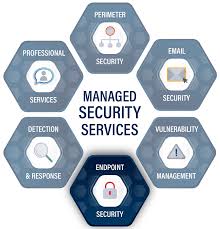Cybersecurity is no longer a luxury reserved for large enterprises. In 2025, small businesses across the USA face more digital threats than ever before. With ransomware, phishing, insider threats, and data breaches growing in complexity, having a rock-solid cybersecurity strategy is essential. One of the most effective and trending approaches that small businesses are adopting is the Zero Trust Security model. In this guide, we’ll explain why cybersecurity matters more than ever, what Zero Trust means, and how your business can implement it effectively.
Why Cybersecurity is Crucial for Small Businesses in 2025
Small businesses are prime targets for cyberattacks. Hackers often view them as easy entry points because many lack dedicated IT services teams or strong security protocols. In fact, according to recent statistics, over 43% of cyberattacks target small businesses—and more than half of those businesses fail to recover fully from the damage.
Cybersecurity isn’t just about protecting data; it’s about business continuity, customer trust, and legal compliance. With regulations tightening and customer expectations rising, small businesses must adopt comprehensive solutions that go beyond antivirus software.
What is Zero Trust Security?
The Zero Trust Security model works on a simple but powerful principle: “Never trust, always verify.” This means no user, device, or application—whether inside or outside the network—is trusted by default. Every access request must be authenticated, authorized, and continuously validated.
Zero Trust relies on:
- Multifactor authentication (MFA)
- Least-privilege access control
- Device and user verification
- Endpoint security
- Continuous monitoring and analytics
For small businesses, this means tighter access control and reduced risk of internal and external threats.
How Zero Trust Helps Small Businesses
Implementing Zero Trust doesn’t require enterprise-level investment. Managed IT services providers like Remote Expert Solutions (RES) offer Zero Trust frameworks tailored for small business budgets.
Better Access Control: Only approved users can access specific systems and data, reducing internal threat risks.
Reduced Breach Impact: If a cybercriminal gains access, they can’t move freely across the network thanks to micro-segmentation.
Stronger Compliance: Helps meet data protection laws like HIPAA, CCPA, and others that demand strict access control.
Improved Remote Work Security: As remote work becomes standard, Zero Trust ensures security regardless of device or location.
Peace of Mind: Knowing your systems are protected 24/7 through verification, monitoring, and enforcement gives you freedom to focus on growing your business.
Affordable Cybersecurity Solutions with RES
At RES, we help small businesses across the USA build affordable, scalable Cybersecurity strategies rooted in Zero Trust principles. Whether you need endpoint protection, secure remote access, or compliance-ready systems, our managed security services are tailored to meet your needs and budget.
Our cybersecurity services include:
- Endpoint Detection and Response (EDR)
- Zero Trust Architecture Setup
- Cloud Security & Multi-Cloud Monitoring
- Managed Firewall Services
- Phishing & Threat Simulation Training
- 24/7 Security Monitoring & Incident Response
By outsourcing your cybersecurity needs to RES, you gain enterprise-grade protection without the overhead of hiring full-time IT staff.
Advantages of Cybersecurity & Zero Trust in 2025
Strong cybersecurity isn’t just defensive—it’s a business advantage.
Enhanced Customer Trust: Customers trust businesses that protect their information.
Business Continuity: With data protection and incident response, your operations remain uninterrupted.
Regulatory Compliance: Avoid fines and legal issues with built-in safeguards and audit trails.
Risk Mitigation: Identify and neutralize threats before they cause damage.
Operational Efficiency: Automated monitoring and alert systems reduce manual oversight.
Future-Proofing: Stay ahead of evolving threats by implementing scalable and adaptive security frameworks.
Why Small Businesses Delay Cybersecurity (And Why That’s Dangerous)
Many small businesses believe they’re “too small” to be hacked. This misconception creates a dangerous vulnerability. Cybercriminals often target small businesses precisely because they know they lack strong defenses.
Others avoid cybersecurity upgrades because they fear the cost or complexity. However, solutions like those from RES are designed to be both affordable and easy to manage. In fact, the cost of preventing an attack is almost always lower than the cost of recovering from one.
Steps to Implement Zero Trust for Your Business
- Assess Your Current Environment: Identify what users, devices, and data need protection.
- Segment Your Network: Prevent lateral movement by separating critical assets.
- Enforce Identity Verification: Require MFA and strong password policies.
- Set Up Role-Based Access: Give users only the permissions they need.
- Use EDR and Continuous Monitoring: Detect threats in real time.
- Train Your Employees: Educate staff about phishing and security best practices.
- Partner with a Trusted Provider like RES: Let experts handle implementation, updates, and compliance.
FAQs About Cybersecurity and Zero Trust for Small Businesses
1. Is Zero Trust expensive to implement?
Not necessarily. RES offers scalable Zero Trust solutions that align with small business budgets.
2. How quickly can I get protected with Zero Trust?
Initial setups can be completed within days. Full rollouts may take a few weeks depending on your systems.
3. Do I need new hardware for Zero Trust?
Not always. Many security enhancements can be added to existing infrastructure.
4. What’s the biggest threat to my small business today?
Phishing remains the top threat, often leading to ransomware or data breaches.
5. How does RES monitor for threats?
We provide 24/7 monitoring, alerts, and incident response to detect and stop attacks before damage occurs.
6. What if my business stores data in the cloud?
Our cloud security services protect cloud apps like Microsoft 365, Google Workspace, and AWS.
7. Is cybersecurity mandatory for compliance?
Yes. Regulations like HIPAA, PCI-DSS, and GDPR require strict security practices.
8. Can RES train my team on cybersecurity?
Yes. We offer staff training and simulated phishing attacks to build awareness.
9. What if I already use antivirus software?
Antivirus is not enough. You need layered protection, identity controls, and real-time monitoring.
10. Is Zero Trust only for tech companies?
No. Every industry can benefit from Zero Trust—retail, healthcare, finance, education, and more.
Final Thoughts: Secure Your Future with RES
In 2025, the cybersecurity landscape is more complex than ever—but small businesses don’t have to face it alone. With Zero Trust security from RES, you can build a secure, resilient IT environment that supports growth, protects your data, and keeps you ahead of threats.
Cybersecurity isn’t just an IT issue—it’s a business survival strategy. Let RES be your trusted partner in safeguarding your business, reputation, and future.
Take the first step toward true security. Partner with RES and embrace Zero Trust today.
Contact Us
Admin@remotexpertsolutions.com






